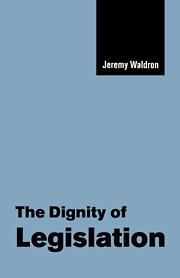4 - Locke's legislature (and Rawls's)
Published online by Cambridge University Press: 15 December 2009
Summary
I
The author of A Theory of Justice thinks it obvious that legislative decisions will be subject to constitutional restriction and judicial review in a well-ordered society. The author of Two Treatises of Government, written almost three hundred years earlier, thinks it obvious that they will not be (II: 150). What are we to make of this difference?
We might just put it down to a difference in institutional experience (perhaps proving Hegel right about the pretensions of normative political philosophy: the owl of Minerva takes flight from a different perch in 1680s England, whose pride is its Parliament, than in the United States in 1971, whose liberal selfimage remains fixated on the Warren court). What I would like to do in this chapter, however, is argue that these texts display different ways of doing political theory, and in particular that they display different conceptions of the relation between substantive argument about justice, rights, and property (on the one hand) and arguments about political institutions and responsibilities (on the other).
Most of what I am going to say will be about John Locke rather than John Rawls, because it is Locke who is the challenge or the conundrum here. Locke is supposed to be the founder of liberal constitutionalism, the theorist of natural rights, the philosopher of the limited legislature. So why in the Second Treatise does he argue that the legislature is supreme, that it must never be subject to any other body, and thus to judicial review or anything else, at least while the government lasts?
- Type
- Chapter
- Information
- The Dignity of Legislation , pp. 63 - 91Publisher: Cambridge University PressPrint publication year: 1999
- 3
- Cited by

